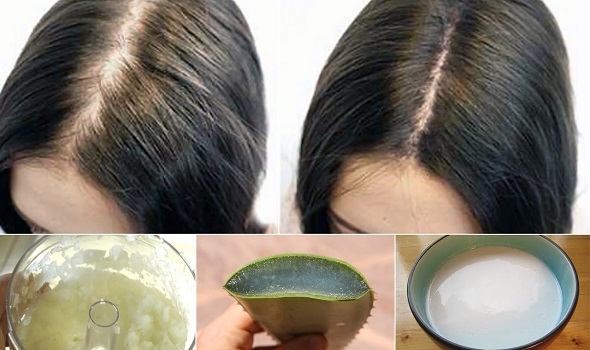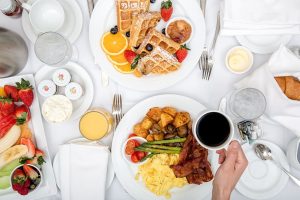Natural Home Remedies to Stop Hair Fall

The “crowning splendour” of a person, their hair directly reflects their personality and sense of style. Particularly for women, excessive hair fall can be a bothersome issue that frequently causes stress and lowers self-esteem. However, if detected correctly, you can stop hair loss with several natural home remedies that work to keep your locks healthy.
Causes of Hair Loss
1. dietary deficiencies
It’s likely that important nutrients like iron, copper, zinc, and proteins aren’t present in your diet. Vitamin D insufficiency is another factor in hair loss. Make sure you go outside and get some sun to prevent this.
2. Imbalance in Hormones
Women may encounter hormonal imbalance after the age of 30, which can result in hair loss. This is typically brought on by an excessive conversion of DHT. Although oestrogen is the primary androgen that women make, the female body also contains testosterone and other androgens like DHEA. Women may start to convert these androgens to DHT as they become older.
3. Thyroid conditions
The cycle of hair growth may alter if the thyroid gland, located at the front of the neck, produces too much or not enough thyroid hormone. However, in addition to hair loss, you may also experience weight gain or loss, sensitivity to cold or heat, and changes in heart rate if you do have a thyroid condition.
4. Polycystic ovary disease (PCOS)
A hormonal imbalance in women with polycystic ovarian syndrome (PCOS) results in greater than normal amounts of androgens. This frequently results in hair on the face and body growing while the hair on the head thins out. Additionally, PCOS can cause ovulation issues, acne, and weight gain.
5. Stress
Sudden hair loss that may linger for several months might be brought on by extreme stress. Your chances of experiencing hair loss will be lower if you reduce your stress levels through exercise, yoga, meditation, and massages.
Medical Care for Hair Loss
1. Minoxidil
The varieties of this over-the-counter drug include liquid, foam, and shampoo. Apply the product to your scalp once daily for ladies and twice daily for males for the greatest results. Foam is the most popular choice because it can be applied to wet hair.
Products containing minoxidil help with hair regrowth, reduce hair loss, or occasionally both. For the treatment to start working or to stop additional hair loss, it must be used for at least six months. Additionally, the length of time depends on the person. A side effect could be itching of the scalp.
2. Prescription Spironolactone Pills
This medication, also known as Aldactone, addresses hormones to treat hair loss. As a result of binding to androgen receptors, less testosterone is processed by the body. It is advised that you consult a physician or pharmacist about the potential advantages and disadvantages of spironolactone.
3. Laser and Light Treatment
For those with androgenic alopecia and pattern baldness, laser devices may encourage hair growth. These are some additional names for laser therapies:
- Red light therapy
- Cold laser
- Soft laser
- Photobiomodulation
- Biostimulation
Exercises And Yoga For Hair Growth
1. Exercises
Follow these exercises for improved hair growth that occurs naturally.
Jogging: The pores on our scalp are frequently ignored. Running induces perspiration, which is very beneficial for hair development.
Neck workouts: The best exercises for your neck will aid in hair development.
Hops from side to side :- Hoping from side to side promotes hair growth in addition to maintaining cardiovascular health.
2. Yoga
Following is a list of yoga poses that promote hair growth:
- Kapalabhati
- Adho Mukha Svanasana
- Sarvangasana
- Balasana
- Sirsasana
- Vajrasana
- Uttanasana
- Matsyasana
Essential Oils That Help With Hair Fall
1. Lavender Essential Oil
Hair growth is reportedly sped up by lavender. It possesses qualities that aid in cell growth and stress reduction. Researchers have shown that it promotes hair growth as well. Its antimicrobial and antibacterial characteristics are an added bonus because they aid to improve the health of your scalp.
Apply this oil straight to your scalp by combining 3 spoons of it with a carrier oil, such as melted coconut oil or olive oil. Before washing it with shampoo, let it sit for 10 minutes and soak into the hair. This procedure can be repeated multiple times per week.
2. Peppermint Essential Oil
Research using peppermint oil has shown that it boosts the quantity, depth, and general growth of hair follicles. During the developing phase, it aids in stimulating hair growth.
Add two drops of peppermint essential oil to your choice of carrier oil. Before completely washing your hair with shampoo and conditioner, give your scalp a massage for five minutes to reduce stress.
3. Rosemary Essential Oil
In addition to hair growth, rosemary hair oil is a fantastic option if you also think that hair thickness is a problem. It can increase cellular production, and it works just as effectively as minoxidil with less adverse effects.Applying lavender oil to your scalp is similar to applying rosemary oil to your scalp.
Tips For Controlling Hair Fall
1. Shampoo
Understanding your scalp type and selecting the appropriate shampoo are crucial. Additionally, depending on your scalp, you should shampoo your hair. For instance, over-washing hair with a dry scalp or failing to wash oily locks three times each week can contribute to hair loss.
Additionally, check to see if the shampoo contains sulphates, parabens, or silicone, which can weaken your hair and increase the risk of breakage.
2. Conditioner
For your locks, a decent conditioner may do wonders. It has amino acids that support both maintaining smooth hair and repairing damaged hair.
3. Exercise and Diet
You must provide your hair the proper nutrients, notably a lot of protein and iron. However, make sure you exercise in addition to consuming a balanced diet. Yoga and meditation can help you stop losing hair.
4. Chemical Therapy
Rigorous hair treatments like perming, colouring, and straightening are not good for your locks. Additionally, stay away from using blow dryers and curling irons, especially on damp hair, as these appliances essentially boil the water inside your hair shafts, making them brittle.
Keep your blow dryer on the lowest heat setting if you must use it. If you plan to use other heated hair treatments, start with a fortifying leave-in conditioner and end with a shielding spray.
5. Using oil
Oiling strengthens the roots and increases blood circulation. Make sure to massage your hair with oil designed for your scalp once a week. After two hours, cover it with a shower cap and gently shampoo it off.
6. An excess of styling tools
In the long term, using too many products with chemicals on your hair could be detrimental. Give them a break and try natural home-cooked foods as an alternative.
Diet For Healthy Hair
A good diet is the key to having thick, lustrous, and strong hair, while treatments and shampoos do have a part to play.
1. Spinach
Hair loss is primarily caused by an iron deficit. Spinach is a fantastic source of protein, vitamin A, and C in addition to iron. Additionally, it contains sebum, a natural hair conditioner that also gives us calcium, magnesium, and omega-3 fatty acids. These aid in preserving glossy hair and a healthy scalp.
2. Carrots
Carrots, which are known to be healthy for the eyes, also help with hair development since they contain vitamin A. A lack of vitamin A can cause a dry, itchy scalp. Carrots are believed to strengthen hair, increase hair thickness, make hair shiny, enhance blood circulation, shield hair from environmental harm such pollution, and also aid in preventing hair breakage and hair fall.
3. Eggs
Eggs aid in repairing damaged hair since keratin, which makes up 68 percent of hair, is a protein. They are also abundant in biotin, a B vitamin that promotes hair growth.
4. Oats
Oats are a great source of fibre, zinc, iron, omega-6 fatty acids, and polyunsaturated fatty acids (PUFAs), which promote healthy hair growth and thick, full hair.
5. Walnuts
Biotin, B vitamins (B1, B6, and B9), Vitamin E, a lot of protein, and magnesium are all included in walnuts and all help to nourish the scalp and strengthen hair cuticles. Your cells are more protected from DNA deterioration brought on by sun exposure.
6. Lentils
Iron, zinc, biotin, and protein are all abundant in lentils. They also include a lot of folic acid, which is essential for repairing the health of red blood cells, which deliver much-needed oxygen to the scalp and skin.
7. Chicken
High-quality protein is abundant in lean foods like chicken and turkey, strengthening weak hair and reducing breakage.
8. Strawberries and Guavas
The silica content in strawberries is high. A trace mineral called silica is essential for healthy hair development and strength. Aside from these, rice, oats, onions, cabbage, cucumbers, and cauliflower are other foods high in silica. Additionally, vitamin C shields hair from brittleness and breakage. While we frequently consider oranges to be the best source of vitamin C, one guava really has four to five times as much of the antioxidant.
9. Yoghurt
Vitamins B5 and D, which are believed to support the health of hair follicles, are abundant in yoghurt.
10. Sweet Potatoes
In addition to preventing dry, lifeless hair, beta carotene also encourages the production of sebum by the glands in your scalp. This is abundant in orange-colored fruits and vegetables like carrots, pumpkin, cantaloupe, mangoes, and sweet potatoes.








